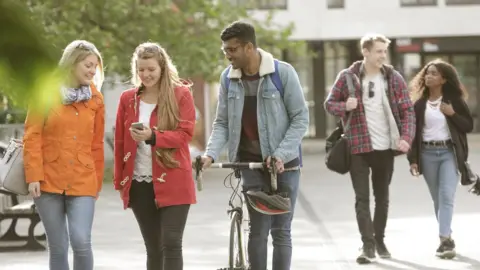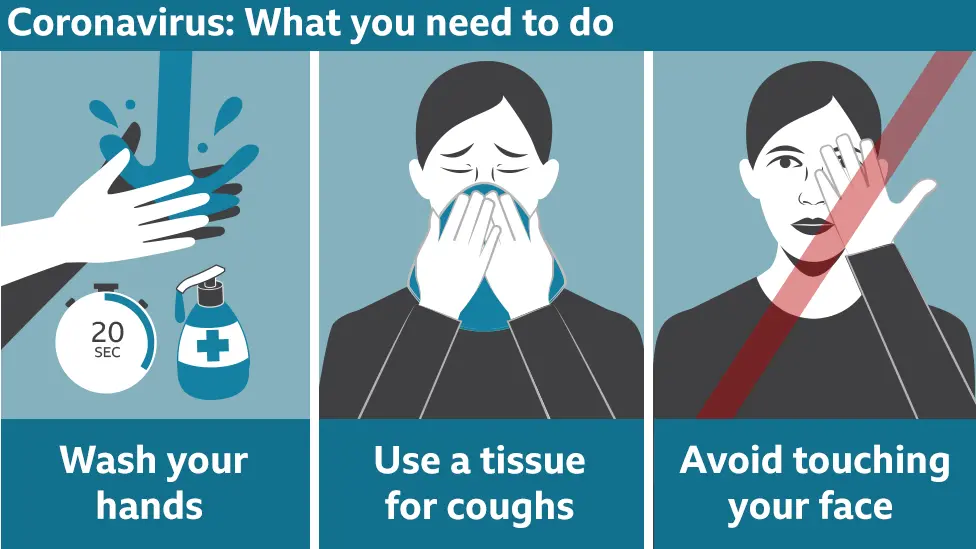Coronavirus: No student parties and more online learning
 Getty Images
Getty ImagesUniversities should switch to full online learning only as a last resort in the event of a local coronavirus outbreak, new guidance says.
The hundreds of thousands of students due to arrive at England's universities in the coming weeks also face a ban on house parties under the "rule of six".
Students must limit socialising, staying within separate "households", and be taught in managed groups.
The mass return of students raises the risk of outbreaks, the guidance says.
The academics' union said it would be safer to switch most teaching online this term and allow students to return only when virus levels were lower.
UCU general secretary Jo Grady added: "Any country with a infection rate anywhere near that of our young people would be removed from the safe travel list.
"We cannot see why the government is insisting young people move around the country and engage in unnecessary face-to-face interactions.
"Moving learning online would remove the need for universities to consider teaching outside or opening doors and windows in the winter months as the guidance suggests."
But the Department for Education guidance reiterates the current position that courses will be provided using a blend of face-to-face and online learning, unless an outbreak occurs locally.
Where social distancing cannot be maintained, teaching sessions will be via technology or moved to more spacious premises.
Mental health
The DfE also stressed there was no evidence face-to-face teaching was unsafe, as long as Covid precautions were maintained.
And it highlighted government Scientific Advisory Group for Emergencies (Sage) advice online-only teaching "would have an impact on students' mental health."
"Universities have been making a mammoth effort to safely reopen campuses and buildings to students this autumn," Universities Minister Michelle Donelan said.
"And the government has worked closely with them."
Campuses have been closed since March and Sage suggests the university return "could amplify local and national transmission".

- SOCIAL DISTANCING: What are the rules now?
- SUPPORT BUBBLES: What are they and who can be in yours?
- TESTING: What tests are available?
- LOCAL LOCKDOWNS: What happens if you have one?
- TEST AND TRACE: How does it work?

On Wednesday, Prime Minister Boris Johnson said: "Many university students are in the age bracket where we have seen the infection rates rise recently.
"My message to students is simple, 'Please, for the sake of your education and your parents' and your grandparents' health, wash your hands, cover your face, make space, and don't socially gather in groups of more than six, now and when term starts."
He added the updated guidance for universities on "how they can operate in a Covid-secure way" included a "clear request not to send students home in the event of an outbreak, so as to avoid spreading the virus across the country".
The guidance also asks universities to identify "safer social activities" for students and create Covid-secure campus bars and students' unions where they can socialise.


And the government expects the universities to use incentives to encourage students to comply with social-distancing measures and disciplinary measures for serious breaches.
Vice-chancellors' group Universities UK said they had been working very hard to put Covid-secure safety measures in place.
Chief executive Alistair Jarvis said: "Life across society will be different this autumn, with university life no exception, with differences to previous years.
"However, students can look forward to a high-quality, rewarding and enjoyable experience."
All universities are also required to plan for a tiered response, depending on the level of risk in the area.
Tier one, the default position:
- a mix of face-to-face tuition and online lessons
- masks worn in crowded corridors and communal areas
Tier two, the fall-back position:
- increased online learning
- face-to-face tuition only where possible and necessary - for example, clinical or practical learning or research
Tier three, when stricter measures needed:
- face-to-face tuition for priority courses such as medicine only
- students advised not to return to family homes
Tier four:
- university buildings closed to everyone except key workers those conducting essential research
The guidance comes as Exeter University signed a contract for tens of thousands of potential saliva tests this academic year.
The results will be provided within 24 hours and fed into the NHS Test and Trace system.
Some other universities, including Leicester, Cambridge and East Anglia, are offering voluntary swab tests to staff and students.
